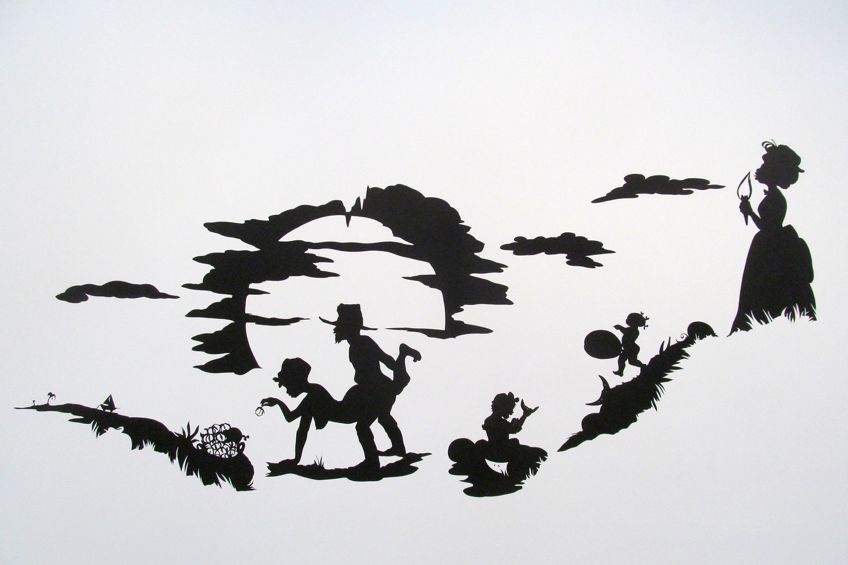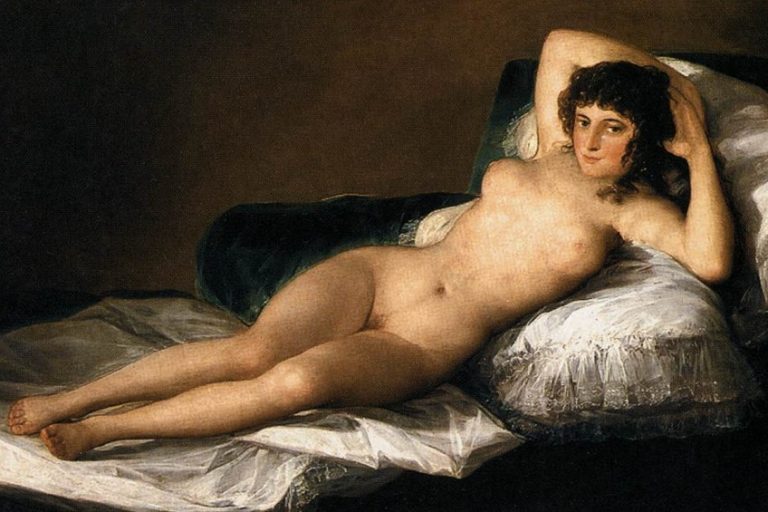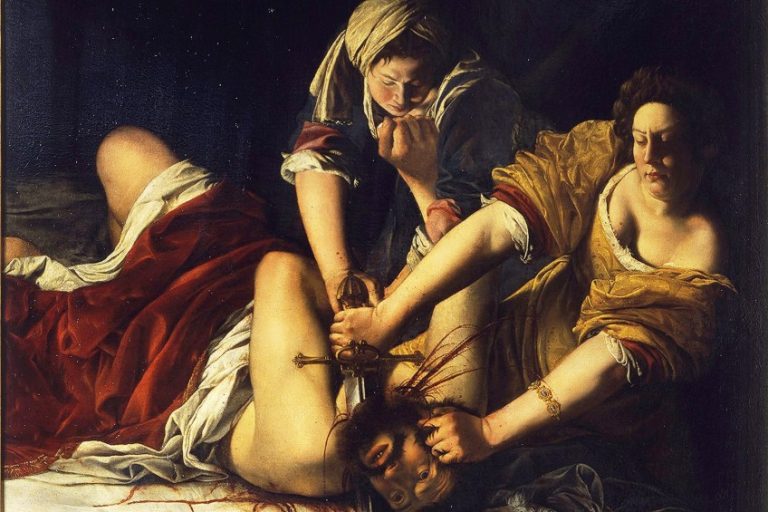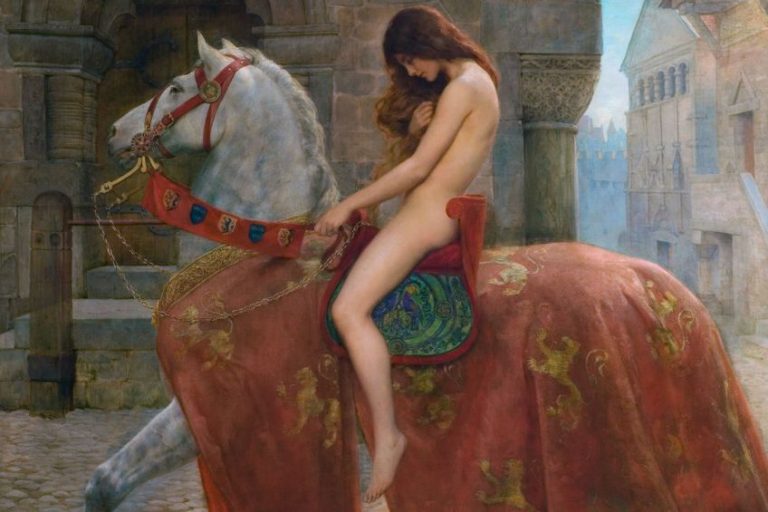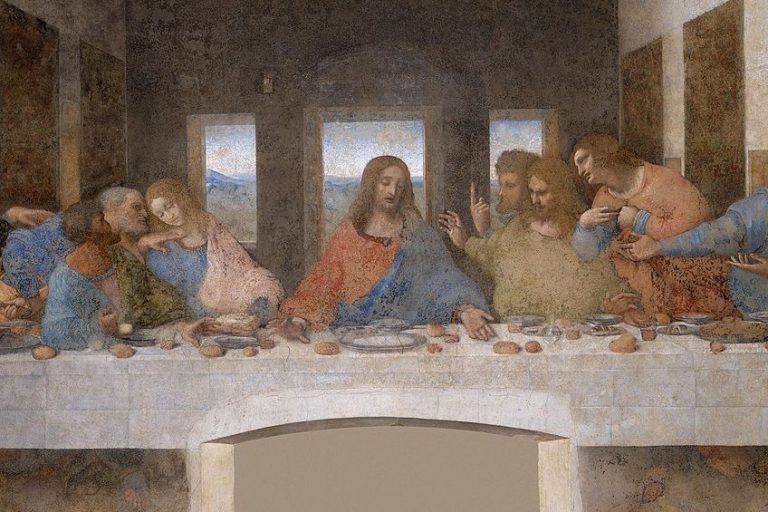Kara Walker Artworks – Provocative Silhouette Art
Kara Walker is a renowned contemporary artist known for her powerful and provocative exploration of race, gender, and identity through the medium of silhouette art. Her artworks often challenge historical narratives and confront societal issues with a unique blend of beauty and critique. In this article, we delve into some of Kara Walker’s top artworks, highlighting their themes, artistic techniques, and the profound impact they have had on the art world and cultural discourse.
Table of Contents
- 1 A Quick Look at Kara Walker’s Career
- 2 Top 10 Famous Kara Walker Artworks to Know
- 2.1 Gone: An Historical Romance of a Civil War as It Occurred Between the Dusky Thighs of One Young Negress and Her Heart (1994)
- 2.2 The End of Uncle Tom and the Grand Allegorical Tableau of Eva in Heaven (1995)
- 2.3 African’t (1996)
- 2.4 Slavery! Slavery! (1997)
- 2.5 Darkytown Rebellion (2001)
- 2.6 Harper’s Pictorial History of the Civil War (Annotated) (2005)
- 2.7 A Subtlety (2014)
- 2.8 Christ’s Entry into Journalism (2017)
- 2.9 Fons Americanus (2019)
- 2.10 Figa (2020)
- 3 Frequently Asked Questions
A Quick Look at Kara Walker’s Career
Kara Walker’s art career has been marked by a remarkable trajectory of creativity and critical acclaim. She first gained widespread recognition in the 1990s for her innovative use of silhouette art to explore themes of race, sexuality, and power dynamics. Her early works, such as Gone: An Historical Romance of a Civil War as It Occurred Between the Dusky Thighs of One Young Negress and Her Heart, shocked and captivated audiences with their bold imagery and provocative narratives, challenging viewers to confront uncomfortable truths about America’s history and social fabric.

As Walker’s career progressed, she continued to push artistic boundaries, experimenting with various mediums and techniques while maintaining her focus on issues of race and identity. Her large-scale installations, such as A Subtlety at the Domino Sugar Factory in Brooklyn, further solidified her reputation as a groundbreaking artist willing to tackle complex themes in visually striking and intellectually engaging ways.
Today, Kara Walker’s contributions to contemporary art are celebrated worldwide, and her works continue to inspire dialogue and reflection on the complexities of the human experience.
Top 10 Famous Kara Walker Artworks to Know
In this section, we delve into the top 10 artworks by Kara Walker, a visionary artist whose work challenges and redefines narratives surrounding race, gender, power, and history. Through her iconic silhouette art, monumental installations, and thought-provoking annotations, Walker confronts viewers with the complexities of America’s past and present, inviting critical reflection on issues of identity, representation, and social justice. Each artwork in this curated list represents a milestone in Walker’s career, showcasing her unparalleled ability to merge artistic innovation with profound cultural commentary. From her early explorations of slavery and racial stereotypes to her more recent engagements with contemporary media and iconography, Kara Walker’s top 10 artworks stand as powerful testaments to her enduring impact on the art world and beyond.
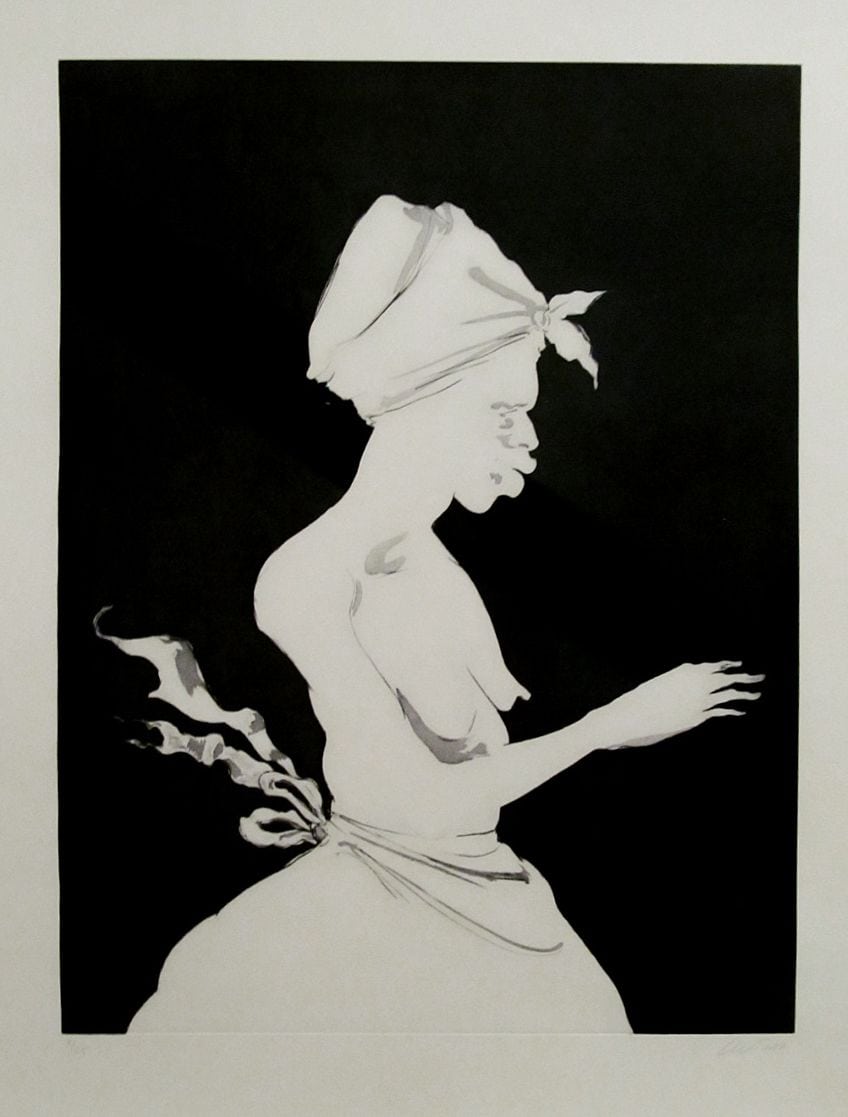
Gone: An Historical Romance of a Civil War as It Occurred Between the Dusky Thighs of One Young Negress and Her Heart (1994)
| Date | 1994 |
| Medium | Cut paper and projection on wall |
| Dimensions (cm) | Variable |
| Where Is It Housed? | Private collection |
This groundbreaking artwork by Kara Walker delves into the complexities of race, gender, and power during the Civil War era. Through her signature silhouette style, Walker portrays a young Black woman’s experience, juxtaposing notions of romance and violence within the historical context of slavery. The piece challenges viewers to confront uncomfortable truths about America’s past, highlighting the intimate and often brutal realities faced by Black individuals.
“Gone” is significant for its unflinching critique of racial and sexual exploitation, sparking important conversations about representation and the legacy of slavery in contemporary society.

The End of Uncle Tom and the Grand Allegorical Tableau of Eva in Heaven (1995)
| Date | 1995 |
| Medium | Cut paper and projection on wall |
| Dimensions (cm) | Variable |
| Where Is It Housed? | Solomon R. Guggenheim Museum, New York City, United States |
In this artwork, Kara Walker continues her exploration of racial stereotypes and historical narratives, specifically referencing Harriet Beecher Stowe’s novel “Uncle Tom’s Cabin.” The piece reimagines characters from the novel, including Uncle Tom and Eva, in a grand allegorical tableau that critiques romanticized portrayals of slavery. Walker’s use of silhouette art and symbolism challenges viewers to reconsider popular depictions of Black characters in literature and media, exposing the dehumanizing effects of racial caricatures.
“The End of Uncle Tom” is important for its subversion of stereotypes and its contribution to discussions about representation and power dynamics in art.
African’t (1996)
| Date | 1996 |
| Medium | Cut paper and projection on wall |
| Dimensions (cm) | Variable |
| Where Is It Housed? | Museum collections and exhibitions worldwide |
“African’t” by Kara Walker confronts notions of Blackness and identity through stark imagery and wordplay. The title itself plays on the word “African” while hinting at the struggle for recognition and agency faced by Black individuals. The artwork features silhouettes of figures engaged in various activities, challenging stereotypes and highlighting the complexity of Black experiences.
Walker’s use of silhouette art in “African’t” subverts traditional narratives, inviting viewers to question preconceived notions and engage with the multifaceted nature of Black identity in a society shaped by historical prejudices.

Slavery! Slavery! (1997)
| Date | 1997 |
| Medium | Cut paper and projection on wall |
| Dimensions (cm) | Variable |
| Where Is It Housed? | Museum collections and exhibitions worldwide |
This installation by Kara Walker explores the brutal realities of slavery and the legacy of racial trauma in America. Through life-sized silhouettes and immersive storytelling, Walker creates a haunting and visceral experience that confronts viewers with the horrors of slavery. “Slavery! Slavery!” is important for its unapologetic depiction of violence and suffering, forcing viewers to acknowledge the atrocities of the past and their lingering effects on contemporary society.
By confronting uncomfortable truths, Walker’s artwork encourages critical reflection on the ongoing struggle for racial justice and equality.
Darkytown Rebellion (2001)
| Date | 2001 |
| Medium | Cut paper and projection on wall |
| Dimensions (cm) | Variable |
| Where Is It Housed? | Whitney Museum of American Art, New York City, United States |
In “Darkytown Rebellion,” Kara Walker presents a complex narrative that challenges conventional understandings of history and power. The artwork features a series of silhouettes depicting scenes of rebellion and resistance, disrupting stereotypical portrayals of Black individuals as passive victims. Through her use of visual symbolism and historical references, Walker reclaims agency and asserts the resilience of Black communities in the face of oppression.
“Darkytown Rebellion” is significant for its nuanced exploration of Black resistance narratives, offering a counterpoint to mainstream narratives that often overlook the agency and strength of marginalized groups.
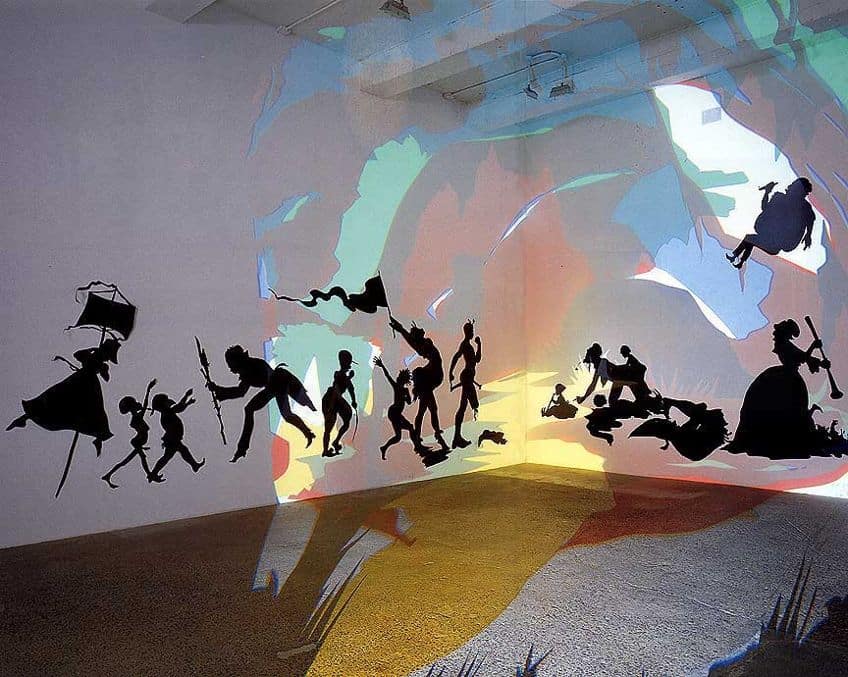
Harper’s Pictorial History of the Civil War (Annotated) (2005)
| Date | 2005 |
| Medium | Silkscreen on canvas |
| Dimensions (cm) | Variable |
| Where Is It Housed? | Museum collections and exhibitions worldwide |
Kara Walker’s “Harper’s Pictorial History of the Civil War (Annotated)” reimagines historical images from the Civil War era through a critical lens. By annotating and subverting these images, Walker highlights the complex and often overlooked roles of Black individuals during this tumultuous period. The artwork challenges traditional narratives of the Civil War, exposing the contradictions and injustices inherent in America’s history of slavery and racial conflict.
Through her annotations, Walker invites viewers to reconsider established narratives and engage with the complexities of race, power, and representation in historical discourse.
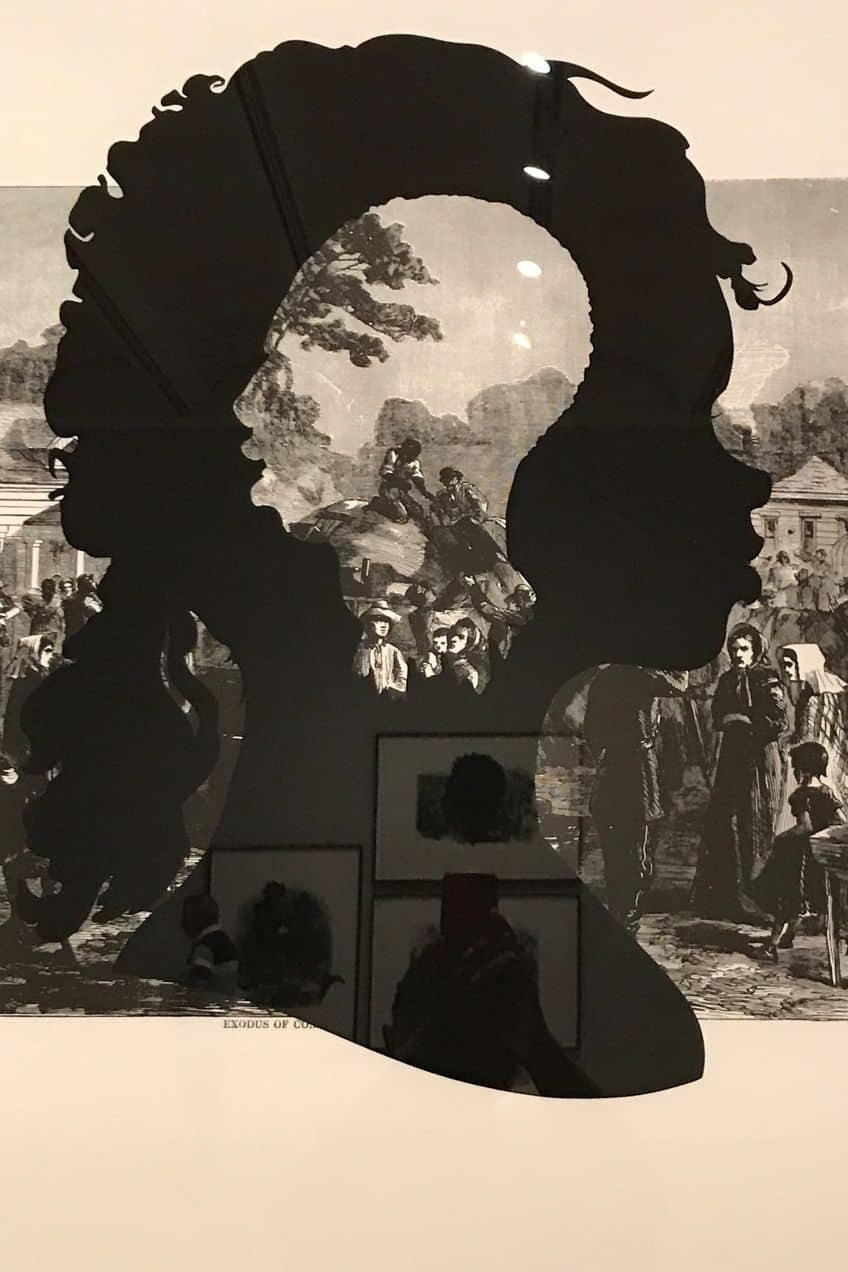
A Subtlety (2014)
| Date | 2014 |
| Medium | Sugar, polystyrene, resin, foam, paint |
| Dimensions (m) | 18.29 x 12.19 x 7.62 |
| Where Is It Housed? | Temporary installation at the Domino Sugar Refinery, Brooklyn, New York City, United States |
“A Subtlety” is a monumental installation by Kara Walker that addresses themes of slavery, labor, and consumption. Housed in the Domino Sugar Factory in Brooklyn, the artwork features a massive sugar-coated sphinx-like figure alongside smaller sculptures depicting child laborers. This powerful juxtaposition confronts viewers with the harsh realities of the sugar trade and its ties to exploitation and inequality.
“A Subtlety” is significant for its use of space and symbolism to provoke conversations about the legacies of slavery and the hidden costs of industrialization.
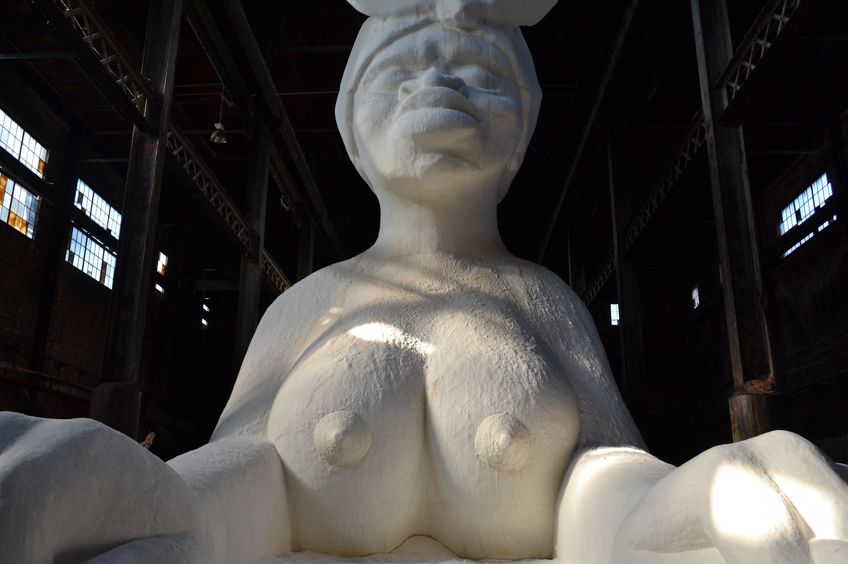
Christ’s Entry into Journalism (2017)
| Date | 2017 |
| Medium | Cut paper on canvas |
| Dimensions (cm) | Variable |
| Where Is It Housed? | Private collection |
In “Christ’s Entry into Journalism,” Kara Walker explores the intersection of religion, media, and racial politics. The artwork depicts a contemporary scene where figures reminiscent of Biblical characters interact with modern-day elements such as smartphones and cameras. Through this juxtaposition, Walker critiques the role of media in shaping narratives of power and identity, drawing attention to the ways in which race and representation intersect in the digital age.
“Christ’s Entry into Journalism” challenges viewers to consider how media influences perceptions and perpetuates stereotypes, highlighting the complexities of contemporary social discourse.

Fons Americanus (2019)
| Date | 2019 |
| Medium | Installation (water fountain) |
| Dimensions (cm) | Variable |
| Where Is It Housed? | Tate Modern, London, United Kingdom |
“Fons Americanus” is a large-scale fountain installation by Kara Walker that draws inspiration from historical monuments and public art. Situated in the Tate Modern’s Turbine Hall, the artwork reimagines the traditional fountain as a symbol of the transatlantic slave trade and its legacies. Through intricate sculptural elements and water features, Walker creates a visually stunning yet conceptually rich environment that invites contemplation on themes of power, violence, and memory.
“Fons Americanus” challenges conventional notions of monumentality and memorialization, offering a nuanced reflection on the complexities of history and heritage.
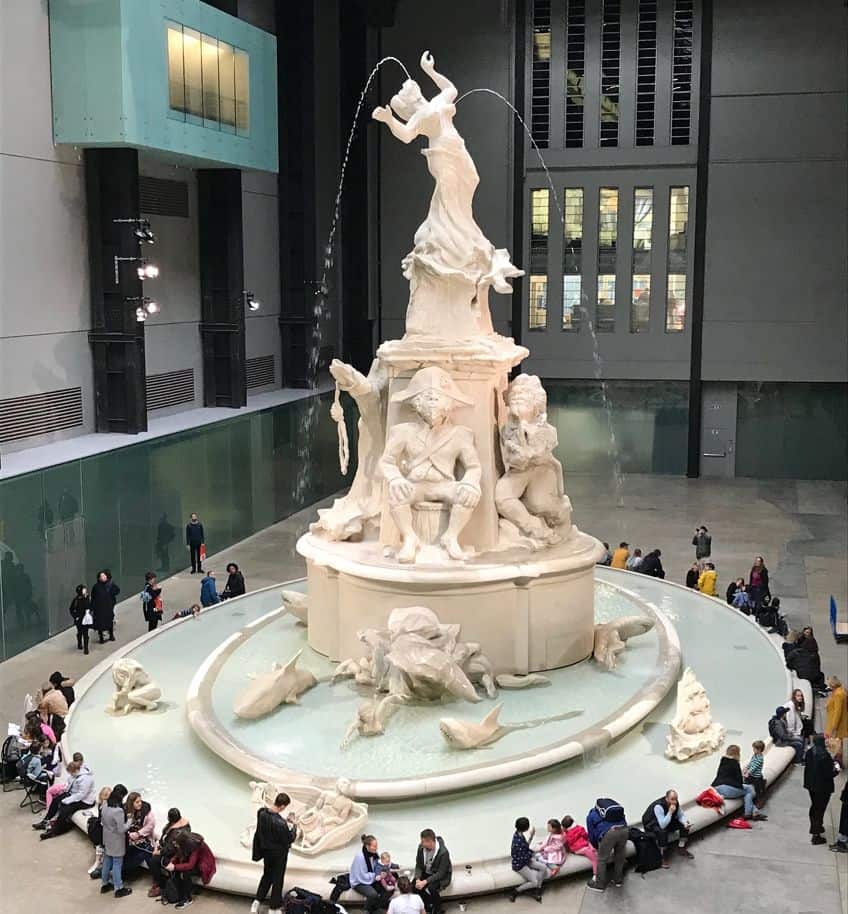
Figa (2020)
| Date | 2020 |
| Medium | Sculpture (bronze) |
| Dimensions (cm) | Variable |
| Where Is It Housed? | Private collection |
“Figa” is a recent series by Kara Walker that explores themes of femininity, power, and cultural iconography. The artworks feature intricate cut-paper designs depicting female figures in various poses and gestures, including the traditional figa hand gesture symbolizing fertility and protection. Through her meticulous craftsmanship and use of symbolism, Walker creates a visual dialogue about women’s agency, identity, and the intersections of race and gender. “Figa” is important for its exploration of feminine iconography and its contribution to ongoing discussions about representation and empowerment in contemporary art.
Kara Walker’s top artworks stand as compelling testaments to her artistic vision and fearless exploration of complex themes. Through her use of silhouette art, she has illuminated the intricacies of race, gender, and history, sparking crucial conversations and challenging perspectives. Walker’s ability to merge aesthetic beauty with profound social commentary has solidified her place as a leading figure in contemporary art, leaving an indelible mark on the art world and inspiring ongoing dialogue about the complexities of identity and representation.
Frequently Asked Questions
What Is Silhouette Art, and Why Does Kara Walker Use It in Her Work?
Silhouette art is a style of portraiture or image-making that relies on the use of outlines and solid shapes, often in a single color against a contrasting background. Kara Walker utilizes silhouette art in her work to explore themes of race, gender, and power in a visually striking and accessible manner. The stark contrasts and simplicity of silhouette art allow Walker to convey complex narratives and provoke critical reflection among viewers.
How Does Kara Walker’s Work Challenge Historical Narratives and Stereotypes?
Kara Walker’s artwork challenges historical narratives and stereotypes by subverting traditional depictions of race, particularly in relation to slavery and Black identity. Through her use of imagery, symbolism, and storytelling, Walker disrupts dominant narratives that often perpetuate harmful stereotypes and presents alternative perspectives that confront viewers with uncomfortable truths about America’s history.
What Are Some Recurring Themes in Kara Walker’s Art?
Some recurring themes in Kara Walker’s art include slavery, power dynamics, gender roles, violence, and the legacy of colonialism. She often explores these themes through historical contexts but also connects them to contemporary issues, highlighting the ongoing relevance and impact of past injustices on present-day society.
Isabella studied at the University of Cape Town in South Africa and graduated with a Bachelor of Arts majoring in English Literature & Language and Psychology. Throughout her undergraduate years, she took Art History as an additional subject and absolutely loved it. Building on from her art history knowledge that began in high school, art has always been a particular area of fascination for her. From learning about artworks previously unknown to her, or sharpening her existing understanding of specific works, the ability to continue learning within this interesting sphere excites her greatly.
Her focal points of interest in art history encompass profiling specific artists and art movements, as it is these areas where she is able to really dig deep into the rich narrative of the art world. Additionally, she particularly enjoys exploring the different artistic styles of the 20th century, as well as the important impact that female artists have had on the development of art history.
Learn more about Isabella Meyer and the Art in Context Team.
Cite this Article
Isabella, Meyer, “Kara Walker Artworks – Provocative Silhouette Art.” Art in Context. April 3, 2024. URL: https://artincontext.org/kara-walker-artworks/
Meyer, I. (2024, 3 April). Kara Walker Artworks – Provocative Silhouette Art. Art in Context. https://artincontext.org/kara-walker-artworks/
Meyer, Isabella. “Kara Walker Artworks – Provocative Silhouette Art.” Art in Context, April 3, 2024. https://artincontext.org/kara-walker-artworks/.


